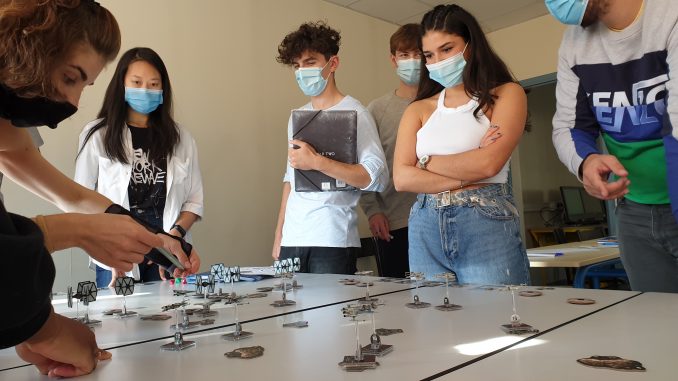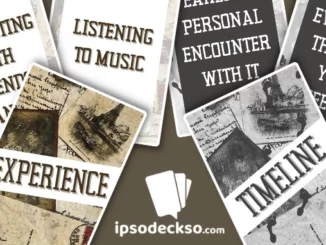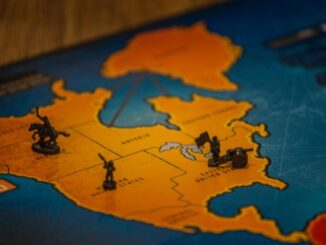
The work presented in this article is part of the EdUTeam educational and research project to assess the relevance of leisure games in higher education (https://eduteam.fr/). Our text is particularly interested in table-top wargames that have been implemented for two years at the IAE Gustave Eiffel (public french business school of Université Paris-Est Créteil).
The definitions and types of wargames are multiple and we will not try to make a synthesis that would not be exhaustive. However, our approach to these games must be clarified in order to understand our educational approach. In our context, a wargame is above all a catalyst artifact to generate realistic managerial situations through a system of rules, scenarios and material (counters, maps, figurines, etc.). Wargames represent historical or fictional environments where several teams are opposed, often asymmetrically.
The key to this definition is the concept of “ realistic managerial situation”. Indeed, despite the decontextualization of environments in relation to real work situations, we found that the acquisition of managerial knowledge was facilitated. The reason is simple but may seem counter-intuitive: as the scenarios do not look like real life, the students engage with authenticity in the proposed situations. Cognitive, pedagogical and organizational routines fall. Participants let go. But that’s not all. Wargames also contribute to the implementation of a real inclusive educational strategy. By replacing evaluations of results with evaluations related to involvement, students who are introverted or inhibited by the complexity of real situations are no longer afraid to engage in the proposed activities. All these assets then facilitate the acquisition of knowledge and the development of managerial skills as well as self-confidence.
The pedagogical plan goes beyond the simple time of the game and incorporates an initial briefing of the session and a particularly long debriefing. But the pedagogical arrangement also overlaps several sessions (the management course on which this article is based is 7 sessions of 3.5 hours). The idea is to propose an experiential learning cycle (Kolb, 1984) per session. This is very important. Too often, students don’t have the opportunity to test what they have just learned. Table-top wargames are again effective allies. The proposed situations are malleable and can be adapted in real time. Their complexity is perfectly mastered unlike digital wargames. It is then relatively simple to perform scenarios with the gradual complexity from one session to the next. The development of skills is then cumulative and in perfect harmony with the logic of experiential learning.
However, decontextualized managerial situations are only a step towards the professionalization of students. The ultimate objective is to support them in steering a realistic managerial situation. Management simulations or integrative learning situations can then be implemented favorably because any cognitive blockages have been removed during previous sessions with wargames. In conclusion, the use of wargames may be the first brick of an educational continuum allowing students to build their career path as future managers.

References and further reading
Kolb, D., 1984. Experiential learning: Experience as The Source of Learning and Development. Englewood Cliffs, Prentice-Hall.
Lépinard, P. (2019). Le projet EdUTeam : Des wargames comme supports d’apprentissage expérientiel au management. In: 3èmes Journées de recherche et de pratique MACCA 2019. [online] Toulouse: HAL. Available at: https://hal.archives-ouvertes.fr/hal-02391528 [Accessed 23 Oct. 2020].
Lépinard, P. (2020). La décontextualisation par le jeu des situations d’apprentissage simulées comme stratégie pédagogique inclusive. In: XXIXe Conférence Internationale de Management Stratégique. [Online] HAL. Available at: https://hal.archives-ouvertes.fr/hal-02619525v1 [Accessed 23 Oct. 2020].
Longley-Brown, G., 2019. Successful Professional Wargames: A Practitioner’s Handbook. John Cury, Milton Keynes.
Wojtowicz, N., 2020. Wargaming Experiences: Soldiers, Scientists and Civilians. J10 Gaming, Delft.
- EdUTeam Wargames – Table-top wargames to train business school students - 5th November 2020





Thank you for this very interesting article. Did the students already use es wargames?
Thank you for your feedback.
The students had never played wargames. I had to lighten the rules. You can find all the information about my article (but it is only in French, sorry) : https://hal.archives-ouvertes.fr/hal-02133862v2.
Armaggedon war! an excellent choice!
What an awesome educational activity! And for once, women are present around the wargames. Is this practice repeated every year or is it just an educational experiment?
The use of wargames with students of this license is recurrent. Unfortunately, we had to stop the face-to-face sessions this year and not all sessions could be completed. But next year, we take out the boxes!
And thank you for your comment!
A very interesting article. Thank you Philippe !